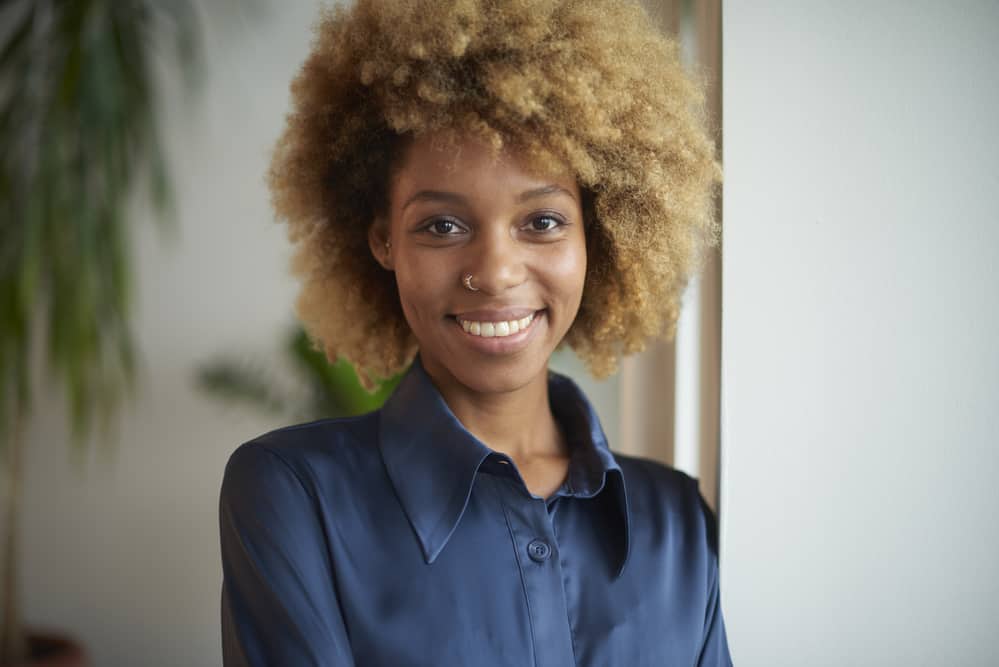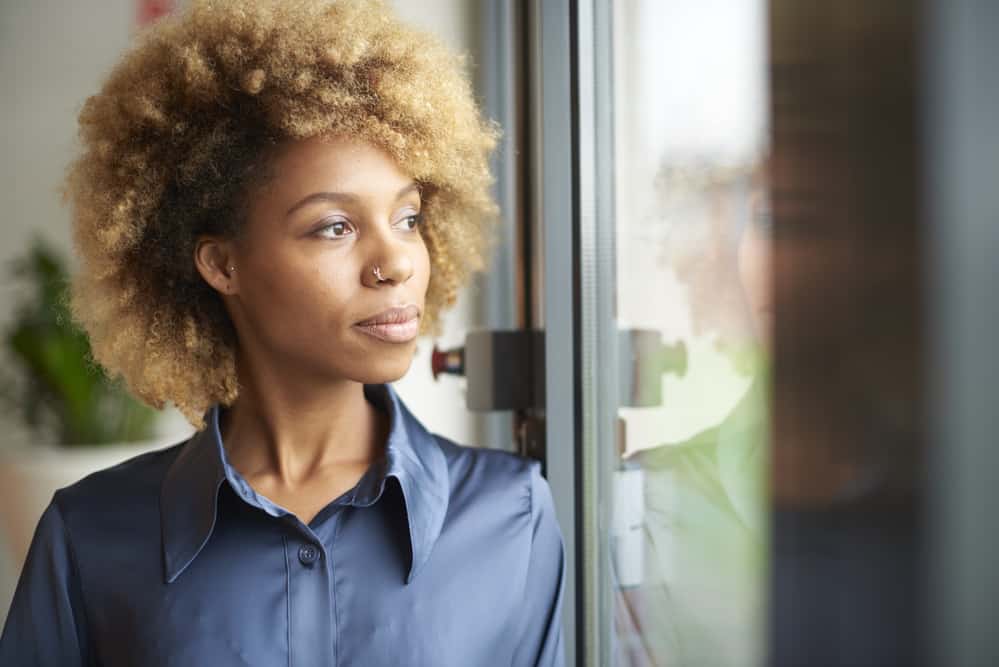
Grandiose hair color transformations have become the norm in today’s society. All over the world, people are using bleach to go from super dark brown to icy platinum blonde and every color in-between.
While experimenting with bleach is a lot of fun, many find themselves wondering whether they’re doing permanent damage to their hair in the process. In this article, we’ll tell you whether bleaching your hair damages it forever and what you can do to preserve your hair as you try out the latest color trends.
Table of Contents
Does Bleaching Your Hair Damage It Forever?
Without a doubt, bleach can cause damage to your natural hair, and when it does, it is permanent. There's no way to magically restore your damaged hair to its previous state.
Once your hair is burnt beyond recognition because you used 50 volume developer or left the bleach on too long, it will never be the same again.
You may be able to slightly improve your hair’s condition, but this is not guaranteed. To understand why bleach causes permanent damage, we’ll jump into the composition of bleach. Read on.
How Does Bleach Damage Hair?
In case you didn't know, hair bleach is usually a mixture of hydrogen peroxide and ammonia. Some high-lift bleaches contain potassium persulphate or sodium metasilicate. These ingredients work to forcibly invade your hair cuticle and remove your natural hair pigment.
You're left with a weakened, albeit lighter, version of your hair. The longer you leave the bleach in, or the stronger the developer you use, the lighter and weaker your hair color becomes.
The bleaching process disrupts the natural elasticity and porosity of the hair. It also ruins your hair texture making it more brittle and dry. Though you can treat your bleach-related hair problems, the effects will be permanent.

How To Minimize Permanent Damage from Bleaching Hair?
Damage from bleaching is inevitable, but there are several ways to minimize it. Check out the list below for some helpful damage prevention tips:
See a Professional Hairstylist
Everyone knows that professional bleaching sessions are expensive but asking a hairstylist for help is great for people with curly or compromised hair.
Professional colorists examine your hair texture and preferences and use the gentlest possible bleach mixture on your hair. For this reason, going the professional route can minimize permanent damage from bleach.
Use a Good Quality Bleach
Using a pre-packaged bleach kit is rarely a good idea. The bleach in these kits may have abnormally high concentrations of chemicals, which increases your risk of permanent damage.
Since everyone has a different hair type, it's better to pick out customized bleaching products versus pre-formulated ones. Some of the best professional bleach brands include Wella, Clairol Professional, and Schwarzkopf.
Use a Low-volume Developer
When it comes to hair bleaching, you should always start with a low-volume developer, especially if it's your first time bleaching your own hair. Using a high-volume developer (30 volume and over) will likely fry your strands.
10 and 20 volume developers are much gentler on the hair and are less likely to leave you with visible damage.
Related Articles:
Try a Test Patch
It's better to stay on the safe side rather than regretting everything later. So, take your chosen bleach and mix it with your developer, depending on how much lift you want, and then apply it to the hair behind your ear.
Follow the instructions on the box and leave it on for the amount of time indicated on the package instructions. If you see no signs of damage, feel free to use it on the rest of your hair.
Don’t Bleach Recently Washed Hair
Don't wash your hair right before bleaching, or it can lead to excessive scalp irritation, which can damage your hair follicles. Naturally, our scalp produces an adequate amount of necessary oils (sebum) that moisturize our scalp and hair.
If you wash your hair before bleaching, your scalp and hair will have nothing to protect it from the harsh chemicals in the bleach. If necessary, wash your hair 48 hours before bleach day.
Don’t Overprocess
Many bleach-related hair disasters can be prevented by setting a timer and rinsing the bleach out on time. Though bleach begins to damage your hair immediately after you apply it, the less time it sits on your hair, the better.
So, do yourself a huge favor and set your timer immediately after you’re done applying the bleach. Your hair will thank you.

Can You Repair Bleach Damaged Hair?
You can't restore your hair to its original condition (e.g., virgin hair), but there are ways to considerably improve your hair’s health. With a few hair care routine changes, you can make your curls shinier, stronger, and more elastic after a bad bleaching session. Read about your options below:
Hydrating and Sealing
Almond, argan, coconut, and olive oils all help hydrate your hair. Their fat molecules are small enough to penetrate the strands versus just sitting on top.
Sealing oils, such as jojoba oil and Jamaican black castor oil, seal in the hair’s moisture for lasting hydration. In addition, you can restore your hair’s shine and prevent further breakage with pre-poos and hot oil treatments.
Avoid Heat and Sun Damage
After bleaching, your hair will be more vulnerable to heat, so we recommend using heat protectants and other hair products that contain SPF protection to protect against UV rays. Also, if you can avoid heat styling for a while, you’ll notice a real difference in your hair.
Use Deep Conditioning Treatments and DIY Hair Masks
Deep conditioners are extremely popular in the natural hair community because of the vast array of benefits they bring to damaged hair.
With a simple internet search, you can find protein-based deep conditioners, moisturizing deep conditioners, anti-breakage deep conditioners, and much more. Some ladies also use a pre-shampoo conditioning treatment (click here to learn more).
Home remedies are another creative way to improve the condition of your hair after bleaching. Masks containing honey, bentonite clay, egg white, rice water, etc., are perfect for repairing your hair strands inside out. These masks show effective results within a week of usage!
Avoid Tight Styles
Your hair will be noticeably weak after bleach damage, so it’s crucial to opt for gentle, loose hairstyles. Stay away from tight braids, top knots, low buns, and any other styles that require you to slick your hair back. These styles will often leave your hair damaged if you're not extremely careful.
Avoid Chlorine
Do not swim in pool water for the first three weeks after bleaching your hair. Pool water contains high amounts of chlorine, which can further weaken your hair’s protein bonds.
Furthermore, chlorine can also turn your bleached hair green, red-orange, etc. If you're a professional swimmer, it is recommended that you purchase the right equipment, such as a cap, to prevent damage to your hair.
Rinse Hair With Cold Water
It's better not to wash your freshly bleached hair with steaming hot water because it can further open your hair cuticles and dry your hair out.
Excessive hair dryness, especially after bleaching your hair, puts you at an increased risk of breakage. Instead, use cold water when washing your hair to lock in some much-needed moisture.
Use a Leave-in Conditioner
Leave-in conditioners help nourish hair on a daily basis. They are usually more lightweight than regular rinse-out conditioners, making them ideal for styling.
You can buy a leave-in at your nearest beauty supply store but be sure to check the ingredients - you need one that has moisturizing ingredients like aloe vera, olive oil, and honey.

- How to Slightly Darken Bleached Hair at Home
- Stages of Bleach on Black Hair
- How to Bleach Black Hair at Home Without Damage
- How to Bleach Dreads Without Damage
So, there you have it - bleaching your hair can cause permanent damage that is unrecoverable in the vast majority of cases. Those hair-altering bleaching agents are to blame.
However, with proper care and remedies, you can minimize bleach damage and improve the quality of your bleached hair over time. We wish you the best with your hair!




